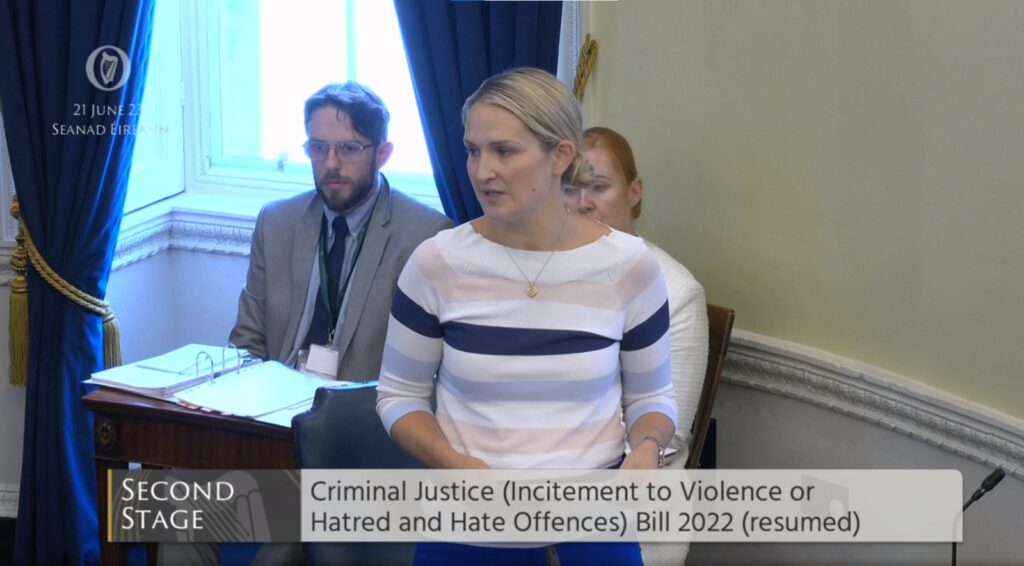The controversial ‘Hate Speech’ legislation completed its Second Stage debate in the Seanad this week. Speaking to us, the Minister for Justice indicated that she would not rush the Bill through the Seanad.

So concerned citizens and voters have time and opportunity to make their views known in the coming fortnight. Please do so – especially to Government TD’s and Senators, and directly to the Department of Justice.
I think Minister McEntee needs to hear from you because she has got the idea that people are victims of a ‘campaign of disinformation’ by ‘certain commentators, and on social media’ … ‘especially with regard to the public consultation’.
Since she’s brought up that 2020 public consultation, I am presenting here some points of information from the Department of Justice after that consultation. I have highlighted some of the phrases in bold just to show how far the Government has departed from this consultation and its results.
The published outcomes say:
‘for this report we have chosen working definitions that reflect the real-life experiences that communities have told us they experience as hate speech and hate crime. Of course any legislative definition will need to be more precisely construed.’
‘Thresholds for criminal hate speech in particular need to be high, to avoid any disproportionate or unnecessary impingement on these fundamental rights which every person is entitled to enjoy.’
‘The criminal law, particularly as it applies to hate speech, should always be the measure of last resort. There is no doubt that criminal legislation alone will not solve the problem of hate speech, and is not suitable for dealing with many of the milder forms.’
The Irish Council for Civil Liberties proposed:
‘Hate speech, though abhorrent, should only be outlawed in the most extreme cases such as incitement to violence.’
‘Other forms of hate speech, which might cause deep offence for example but do not reach a criminal threshold, should be combated by other means.’
‘only extreme forms of hate speech that might lead to acts of hostility, discrimination or violence should be criminalised.’
A number of senators informed the Minister that they had received voluminous correspondence opposing the Bill on similar grounds.
Yet, somehow, the Minister still thinks that the criminalisation of undefined ‘hatred’ is what the public wants.
Closing the debate on Wednesday, the Minister sought to reassure us that we should not fear a restriction of free expression, the lack of a definition of ‘hatred’, or worry that there is anything surreptitious about her including a radical new definition of ‘gender’ in the legislation. But words matter. Especially in criminal law. This Bill allows anyone to be subject to prosecution for undefined hate speech at a time when ordinary people are regularly accused of hatred for the political views they hold and vigorously espouse.
The Minister’s mask slipped only twice.
The first time was when she reassured us that the understanding of ‘hatred’ was the one ‘commonly understood by the judge, by the jury, by the Director of Public Prosecutions.’ Whereas last week the Minister had referred to the one ‘used by the courts, the Garda and the DPP’. So where has the Garda definition gone – you know that vague one which says ‘perceived by any person to, in whole or in part, be motivated by hostility or prejudice’? Poof! It just disappeared – or has it?
The second slip was in the Minister’s closing remark: ‘For people who perhaps are not strong and are not able to deal with some of the targeted abuse and online hatred, we need to make sure there are protections in place to support them, and that is exactly what I am trying to do here.’
It’s meant to sound kind. But it means that the fundamental right of freedom of expression is to be suppressed in response to undefined online robust abuse – as if there were an equivalence, and as if that were the purpose of the criminal law.
When good intentions are filtered through the sieves of vested interests (‘stakeholders’) the common good can suffer. The Hate Speech elements in this Bill are proof positive of this.
